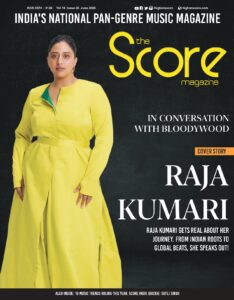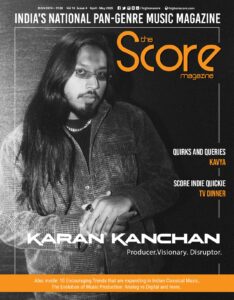What inspired you to pursue a career in the music industry?
I spent most of my childhood and teen years scavenging the internet for new music.
There is something to the thrill of finding a new artist/sound and going down the rabbit
hole of their discography. It really started with stumbling upon Metallica and The Beatles
(on the same day for some reason). I wanted to do something that gave me a lot of joy
personally but could also make it accessible to others. So a career in the music
industry, in roles that connect artists to their fans was a natural fit.
As the head of TuneCore for South Asia, what are your primary responsibilities
and objectives?
The team at TuneCore India has done an incredible job in enabling local artists to take
their music to fans across 150+ music streaming platforms in the region but also across
the world. It really is about removing any barriers to entry and making the music industry
open for every artist who wants to be a part of it. That really is the job:helping to
educate artists on how they can make a career as independent artists by leveraging a
platform like TuneCore to reach more fans and grow as musicians. We are the only
global, independent distributor to have a local team here in South Asia. The most
exciting part of the role is building grassroots programs that can not only give back to
the independent music industry but also help it grow to its full potential.
What unique challenges and opportunities do you encounter while operating in
the South Asian music market?
South Asia is one of the most diverse music markets in the world. The biggest challenge
is you simply can’t have a ‘Pan South Asia’ strategy for any business. Brands need to
be very thoughtful about local industry nuances and location-specific artist needs. But in
the challenge also lies the opportunity. South Asia is one of the fastest growing music
markets in the world, largely driven by local music consumption. By leaning into the
growth of music in local languages, we have an unique opportunity to be on the ground
floor of the future of music,identifying those artists who are going to be tomorrow’s
global stars, spotlighting them at an early stage of their careers and helping them reach
their potential.
How do you envision TuneCore’s role in supporting independent artists and
musicians, especially women in India?
It is important that the music industry gears its efforts towards making the playing field even, rather than creating a separate one. At a global level, each year TuneCore commissions the annual BE THE CHANGE: Gender Equity in Music study that analyzes the root causes of gender disparities in the music industry and offers actionable solutions to combat them. What makes this unique is that the study is truly global, sourcing data from 133 countries, including India.
Can you share any strategies or initiatives you’ve implemented to empower
artists and promote their work?
Much of TuneCore’s marketing strategy in the region is community driven. For example,
our playlist ‘TuneCore Next’ showcases upcoming indie artists from India, every month
one TuneCore artist features on the cover of the playlist and we leverage social media
to elevate their profile. The TuneCore Grant, now in its third third installment, is
designed to support artists at a local level, awarding an endowment of INR 100,000 to
the winning artist to help propel their career. Live music is important to any independent
artist’s long term sustainability. Through live partnerships, we have offered TuneCore
artists the opportunity to perform at major festivals, including Bloomverse Festival at
Shillong. By partnering with live promoters, we are able to provide opportunities to our
artist community so they get to play, learn from fellow musicians and reach a wider
audience.
How do you navigate cultural differences and diverse music landscapes across
South Asian countries?
The musical ecosystem of South Asia is nothing like anything else in the world. There
is, of course, a long standing history of classical music, but it is also a market where
western genres co-exist with a very uniquely South Asian concept of discovering music
through language—And there are many languages. Audiences are multilingual so often
they listen to a much wider range of music. Additionally, the widespread popularity of
Punjabi hip-hop and Telugu film music has opened a whole new avenue for fans to
discover music regardless of language, which is a veryvery unique aspect of our
market.
In your opinion, what are the emerging trends or shifts happening in the music
industry in South Asia?
A lot of the current trends and areas of focus for the industry really stress on a return to
the fundamentals. Artists we’ve seen grow substantially in the last year are musician who pull fans to them vs. ‘push music to fans’. Direct to fan connection and community
building is going to continue to deliver more success stories in the coming years.
Discovery of music through social media has become a mainstay, but what we are also
seeing is that the gap between the release of a song and when it gains mainstream
traction is increasing. This is great news for artists with catalog music and is also a cue
to artists to continue releasing more music and allowing it to find audiences over time.
What advice do you have for aspiring musicians and entrepreneurs looking to
establish themselves in the South Asian music scene?
Lean into your identity. South Asians are having a moment globally and there hasn’t been a
better time to be who we are, make the music that feels authentic to us, and find an audience
not just within South Asia, but around the world. There also hasn’t been a better time to be an
independent musician. Every independent artist is an entrepreneur, so educate yourself on the
business side of music even if you plan to have a team do this for you. This will help you sign
better deals for yourself, retain ownership of your music, and maintain the freedom to create the
art you want to create.








